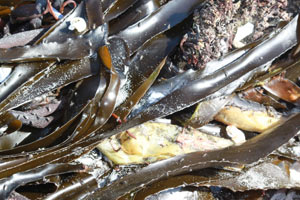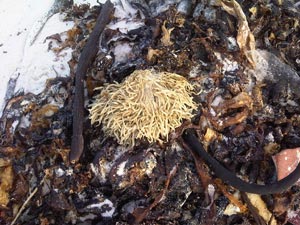Despite the many conspiracy theories surrounding the hundreds of dead abalone which washed up on Melkbos beach last week, the Department of Agriculture, Forestry and Fisheries (DAFF) has denied there is anything sinister to blame. Although they have since advised people to rather not go into the water until their testing is complete.
Hein Wyngaard, Director of Communications for the Fisheries division (formerly Marine Coastal Management), said “according to the evidence we have, this situation of dead abalone washing up on shore is due to a low oxygen event”.
When asked why there would be low oxygen in the water causing some fish to die, he referred to a colleague who said that one reason could be the fact that there is an “unusually high occurrence of plankton in the area and this could be causing the low oxygen which would lead to the death of some small fish and plants”.
He urged people not to “become alarmist” and jump to conclusions over the possible causes for the dead fish, adding that the marlin which washed up on shore in March was nothing more than coincidence.
However, he refused to comment on whether this situation would have any effect on human health as he did not feel he was qualified enough to make such an assessment.
In an interview with 567 Cape Talk radio station later in the day, however, Wyngaard advised beachgoers to rather stay out of the water until their testing is complete.
Wyngaard did confirm reports that all abalone fishing in the Melkbos area had been suspended and that an alert had been sent out to all commercial divers to “stay away from the waters”.
“We have not yet been able to answer the question as to whether this low oxygen is specific to this area or if it is being pushed in from another area. But we will be monitoring the situation,” he said.
Green tide a possibility?
To try get a better understanding of what might be causing the dead abalone to wash up on shore and to clarify whether this meant the water in the Melkbos area was toxic, we spoke to Dr Barry Clark, director of Anchor Environmental, an independent consulting firm based in Cape Town.
While he was unfamiliar with reports of the dead abalone, he admitted that it reminded him of a similar case in the 1970s in Gordon’s Bay where there was what he referred to as a “mass mortality of abalone” which washed ashore.
He speculated that the case was quite similar to what was being reported to be happening in the Melkbos area.
If the situation is indeed the same, it’s an occurrence known as “green tide” and is basically a phytoplankton bloom. This means that toxins released from the phytoplankton cause paralysis of the foot muscles of the abalone, which leads to them being washed off the rocks and possibly ashore.
“I very much doubt the situation has got anything to do with the Koeberg Nuclear Power Station and it would be a very tenuous link if it was indeed related to sewage. I suspect it could be a toxic algae bloom, maybe linked to toxin-producing phytoplankton bloom. For me, this would be the first place I’d look,” he said.
Asked whether this could have any ill effect on human health, Dr Clark said that there was little known evidence that it could affect surfers and swimmers, but strongly advised against eating shellfish for the next few weeks as they could contain the toxins.
This is all the information we have been able to confirm at present, but we will continue to investigate this issue.
(Amy Froneman, Health24, April 2011)
Click here for the Department of Agriculture, Forrestry and Fisheries.




 Publications
Publications
 Partners
Partners











